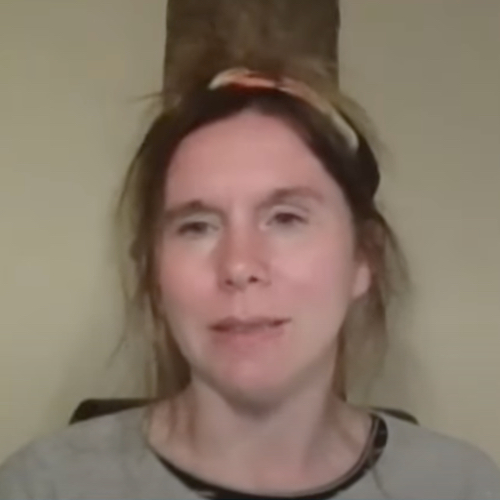My partner had received a heart valve surgery and a bypass in 2016. The consequence of years of high blood pressure and an aneurysm, which was treated with medication until it was no longer possible!
Everything went well, he got better very quickly and the operation was forgotten relatively quickly.
He got a cold/flu in December 2017. At least that’s what the doctor and I thought because he had fever for up to 2 weeks. When he got a little better, we both assumed it was over and actually thought it was the flu. But in January 2018, he felt so bad that he talked about poisoning; that’s how he felt. The doctor gave him pills and sent him home again. It was quite cold at that time and the doctor had advised him not to stay outside in the cold.
In February he had a stroke so severe that he could no longer speak.
By chance I called and found out that he was behaving strangely. I could not understand him and thought he was in a dead zone; you could only understand half of it. Later I called again and it was the same. I was not sure of what was going on. To be safe I called the paramedics. I met him in front of the ambulance and saw him. Although the stroke was obvious, they took him away with suspicion of a stroke. It was assumed that he only had fever, although I told the paramedics that I knew him and that he was not usually like this. Also, the corner of his mouth was crooked. He said he only had fever and he was dehydrated.
When I arrived at the hospital, my suspicions were confirmed. He was finally transported to the stroke unit after a 6 hour stay.
No further action was taken there because of the stroke. After a head CT, 3 strokes were found, 2 smaller, somewhat older ones about 4-6 weeks and the 3rd was very large.
What the doctors could not control was the fever, which nobody could explain. After that, they began to make investigations and detected streptococcus in the blood. He had sepsis. After a few days they started the right treatment and after 9 days, they found an older spleen infarction.
The doctors could not explain the cause of the streptococcus and the resulting sepsis and blamed it on a possible lack of oral hygiene. After 2 weeks, he was transferred with suspected heart muscle inflammation and a possible leak in the heart valve. The doctors wanted to operate the valve.
Antibiotics were administered 3 times a day and countless blood samples were taken before the antibiotics and the dose to use were determined. From the 5th week on, he was discharged, after a heart involvement was ruled out and the inflammation values had subsided. A PET examination was performed in Bonn, which ruled out endocarditis.
I am writing all of this in such details because the blood samples taken 3 times a day as a result of this sepsis led to an anemia which I was not aware of at the beginning. I did not know whether my partner received blood preserves during the heart valve and bypass operation in 2016. Until I saw the PBM program on the dangers of blood preserves, I was not even aware that blood preserves were used in these operations.
Almost 5 months after his release, he suddenly had breathing difficulties. Perhaps I should mention that he hasn’t been able to be alone since the stroke, he was afraid to be alone. I tried to calm him down, but at first I also thought that the warm temperatures were a burden. To be on the safe side, he went to the hospital.
Examinations showed that he had water in his lungs. He was terribly afraid and was not really taken seriously by the doctors and nurses. Although it was proven that he had water in his lungs. Instead, I had been advised to get psychological help.
After 5 days, he was discharged with a referral and an appointment in 2 weeks for a catheter examination.
He couldn’t have lasted that long. His fear of dying was huge.
In my distress I wanted to bring him to the heart center, because he did not want to go to back to the hospital. Since I didn’t know if we would be accepted, I called first. I was recommended to take him to a place where they know the full course of his illness.
And I did so. By now I think that was the biggest mistake I could have made.
After some examinations, they said that the heart valve must be operated again. They did that already in April, but the results did not give a clear indication of damage to the heart valve or inflammation of the heart muscle.
He was given antibiotics again. My impression is that he was fine again under antibiotics. I also did not assume that the operation would be so early. I thought that the inflammation would heal first.
However, the doctors were not able to operate quickly enough. They waited a few days until the inflammation was no longer so high, but in my opinion the operation was much too early.
The doctors took advantage of his fear of dying and imposed another heart valve operation, a Re Op on the open heart. Despite the inflammation caused by the streptococcus and an anemia, which I know of, determined by the family doctor, he was operated on within 1 week after I drove him to the hospital.
Whether the anemia would be a problem or not during the operation was not clear to me as a layman until I saw the PBM YouTube video in 2014. Also, I didn’t know that the high inflammation values were an issue. Although I had a feeling that this could not be right, but I thought again and again, I am not a medical doctor. They should know better about what is right!
Right after the operation, which was “successful”, he was connected to dialysis. The kidney values were not completely good and he should stay in an artificial coma for one day, because of the fine work that is better done in a coma.
But that was not all. A second day was added. On the third day he collapsed. He got problems with his heart. He was implanted with the heart-lung machine.
The heart is too weak!!!!????
And they only noticed that now? A left-sided cardiac insufficiency was diagnosed. Leading to the operation of 08/2016: A heart valve and a bypass because of an aneurysm. Afterwards the pump volume improved and the heart failure was minimal.
He had water in his lungs again but the whole heart was too weak??? It was a real shock! How come they only found out about it 3 days after the operation?
I wanted to know why there was no other solution such as a donor heart (I could not think of any faster solution) instead of just a heart valve Re Op, when the heart is obviously too weak!
Answer of the doctor on duty: what is gone is gone! What kind of answer is that?
After another 3 days, he had to undergo emergency surgery. He had internal bleeding. They couldn’t explain why. They couldn’t localize the bleeding. It continued on a three-day cycle.
After the second operation, the chest was left open for more than two weeks. He was given a continuous supply of blood. As he received the bottles, they flowed out again. At least that’s what it seemed to me.
By chance I learned that he was receiving type O+ blood. I asked him what blood type he had. I did not know that at that time. The nurse said O –
We have nothing else, but he got the good stuff, so she pushed it in. I looked at her, but I couldn’t do anything about it. In my ignorance, I asked if there was anything we had to consider……. Yes, she said, regular tests for antibodies…. I didn’t mean any harm. I’m not part of a medical staff. I just thought for now, it’s good we talked.
I had a hunch something was wrong but as a layman I thought again, they probably know what they’re doing!
He was bleeding like a pig from the nose, mouth, chest. The night before he was sucked out again. They’d just finished when I got there. That’s when I found out he’d had another operation.
It smelled funny and I thought he was in his own blood. I asked the nurse to give me something to take in, I thought he shouldn’t be allowed to get bedsores. Reluctantly he took something and wiped it away and told me he had preserved. When I understood that it was not blood but his own stool, I asked him why he was not cleaned! I was upset. The orderly just said he wouldn’t know. It would be uncomfortable for you; you have to clean it up. I was more upset about what he said. It was not possible. He had so many wounds on his body and an open chest and he gets answers like that? After that I had to leave the room. Some time passed. Then I was allowed back in. The nurse told me that he had been lying in his own excrement all the way up to his neck. You have to imagine that. With these wounds, a danger of infection without equal and he lay in his own excrement.
I stayed with him. He began to bleed, and it became gradually more and more. He bled massively from the open chest.
They had put some drains, but the bleeding did not stop. Only when they had got the bleeding under control did I drive home at 5 am.
I hardly slept and the phone went off early. I was supposed to come by again, they had to talk to me.
When I arrived, they told me that the heart-lung machine would be removed. They didn’t ask me.
I didn’t want to, because the heart surgeon told me, cold as ice and with a shrug of the shoulders, either he would make it, or he would not!
I tried to argue, but I didn’t know what to say. I didn’t want to take the risk that removing the ECMO would end his life. But the heart surgeon told me that my partner had received the highest possible therapy that any human being can receive. More would not be possible. That’s when the mother came in. He turned to her and briefly explained what they were doing. Then he went away.
What does that mean? He would have received 120 units of blood?? The highest possible therapy a person can receive. I can’t believe that. Restless and afraid, I waited. Few hours passed, then I was allowed to see him.
After the PBM Youtube video from 2014, I could think about it. Based on 5 liters of blood, he had 24 times the blood “exchanged ” if I can interpret it that way. And that wasn’t even his real blood type. O- is the only blood type that can’t handle another blood type.
By now I also understand why the immune system was completely overstrained and why he had so many complications.
After the removal of the heart-lung machine, I was naturally very afraid that he would not survive, that he would die. It was expected by the nurses. But he fought. It took almost another week for the chest to close.
This also went well although I was afraid that it would not work because of all the water in the body. The dialysis was discontinued. Anesthesia (Propofol) was discontinued and he started to convulse.
After 3 days, he received a low dose of propofol again, 2.5 ml or mg. The reason was that he became calmer. He was intubated and he slowly became more awake… and because of the seizures he was given it for another 3 days. It took 6 days before he had a neurological examination.
The head CT revealed several small strokes. They wouldn’t be that old, but they’d be too old to solve.
That’s probably why he’s seizing. They can’t say for sure, nor what the consequences of these strokes are.
They injected him with an anti-seizure drug without knowing for sure if the seizures were the cause of the strokes. I was angry, and I asked how this could have happened.
The doctor on duty only spoke about the tracheotomy. And I didn’t even care. I wanted to know why he had these strokes.
She answered me rather unkindly: He has been told that this can happen.
An answer that made me extremely angry, but which I could not do anything about.
At least I wanted to know what he’s cramping for! You can’t just inject him with antispasmodics when you don’t know what he’s cramping for!
In order to find out exactly, you have to take the measurement during a seizure, I was told. But the neurologist had no time. He would be alone…? No time?
The seizures subsided and the light dose of Propofol was stopped.
And he wasn’t seizing at all anymore.
I looked it up afterwards because I wanted to know whether propofol is detectable post-mortem, which can trigger a side effect of propofol, breathing difficulties and seizures. They made me believe that the seizures had something to do with the small strokes he had during the artificial coma (strokes caused by the blood preserves). And the seizures stopped.
Conclusion for me now: the seizures were a side effect of Propofol. In retrospect, it means that the chief physician made a wrong decision because he told me they do not know how he wakes up and what damage was caused by the small strokes in the cerebellum. They suspected that the seizures were caused by the small strokes.
He developed a fever. He would have mushrooms that they couldn’t control… and looked away from the tracheotomy for now.
He was given different antibiotics. Those didn’t work, according to the doctors. They’d have their guidelines, they have to follow them, and if those don’t work, it’s over. That can’t be it, I thought. I begged, please ask in other clinics, there are special clinics that only deal with viruses and bacteria. I asked them if they had an idea, or to move him somewhere else if they don’t want to do anything for him anymore. But they rejected everything.
A friend of mine had a forensic examination. The lawyer told me that my friend had died of pneumonia. I was told that he had fungus that they couldn’t control. Maybe he had both, or maybe he just had pneumonia. Maybe he got the wrong antibiotics? I don’t know.
Under dialysis it was fine. The fever was constant, so normal. An orderly once told me that dialysis can be used to cool or warm the blood. So I thought, why not put him back on dialysis? That was good. But they wouldn’t leave it on. They said the blood would clump together, that’s why. I said it was adjustable.
But they gave up on him. They wouldn’t treat him anymore.
I suspect the reason is that I turned to another clinic to transfer my partner, because I felt that he was not receiving the right treatment.
Strangely enough, the decision to stop the therapy was made on request of the chief physician of the clinic where I asked for a transfer, together with the chief physician of the clinic where he was operated on.
When the dialysis was stopped, the fever rose to 40.9, but sank to 40.1 in the course of the day. But no one was interested anymore.
Although I supported him and did not agree to a therapy interruption, he received further medication for 3 days and then the therapy was terminated by the clinic.
Without medication he had no chances. He had fever, he could not get any supporting medication, no more food and drink.
I looked at this for one day. Then I started having doubts about my decision. His breathing was sluggish, his blood pressure dropped massively, 40.1° C fever. No one wanted to help him. They weren’t ready to transfer him, or ask for other opinions, or do anything for him. The “generous” offer to have him protected was then accepted. This so-called “protection” resulted in the immediate death of my partner. Again, they wanted me to know that his time had come. I just wanted him to get some sleep and not suffer agony under these circumstances until his death as predicted by the doctors.
He had just turned 54.
Unfortunately, he was also considered in here too late: The dying process is initiated when no more food is given. At least here in Germany. Also, the life-supporting measures are slowly shut down. That means that the respiration has also been shut down. I did not know that at the time. I assumed that he was breathing badly on his own. In the meantime, however, I suspect I was led to believe that he was breathing poorly.
After their documentation about the risks of blood preserves I also understand why he had so many internal bleedings and complications. All the information was missing.
Since I contacted the public prosecutor’s office on the recommendation of a friend, his body was examined by forensic medicine.
They are not allowed to give me the results, but I was told so much that my partner had died of a heart that was greatly enlarged beyond the normal size and of pneumonia. He would also have had a lot of damage to his organs.
There was never any mention of pneumonia, except that it had invaded because of the amount of water and blood and had bruises.
I wonder why a heart valve re surgery was performed when the heart was so enlarged. Now I also understand his behavior before and his fear! Another solution would have been appropriate and lifesaving for him!
And since he was a risk patient, a recommendation in a cardiac center after PBM surgery would have been lifesaving.
My question is: Has the Ministry of Health taken action on the issue of PBM and education about it, or have they expressed themselves in any way?
They should receive a complaint for inaction, because according to your studies, 125,000 people die every year, including my partner, and that’s only because nobody has informed us that there is another way.
As described above, my partner had had all the problems to receive blood supply, as mentioned in the 2014 article.
I think it is very, very brave that you don’t let the critics get you down and don’t let yourselves be silenced, because that’s exactly what is done with the relatives.
They are told that the patient’s organs are failing and have no chance. They have been informed about the consequences of the operation. No one questions why the organs are failing! They are not told why the organs are failing.
When I saw your contribution, everything was clear to me. Unfortunately I saw it by chance on TV and my suspicion that my partner was not treated properly was confirmed for me. That makes me so angry! Only unfortunately too late for him.
I do not understand at all why the Ministry of Health does not take action? Why does the policy not make sure that at least this issue is cleared up!
It should be left to the patent holder to decide whether they go to a clinic that saves blood or one that doesn’t care. Instead of enforcing a compulsory vaccination against measles with all possible force, where only an estimated 400 deaths are known, instead of 125 000. Strangely enough, that is also possible!
If we had been enlightened, my partner would’ve still been alive. I am convinced of that!
And nobody supports my assumption. Nobody agrees with me. I am fighting on a lost cause, alone and am looking stupid from all sides.
I cannot even prove that the second operation should not have been performed in this form. I am not a doctor, but even in my layman’s opinion, I have come to the conclusion that my partner would have needed a different solution.







